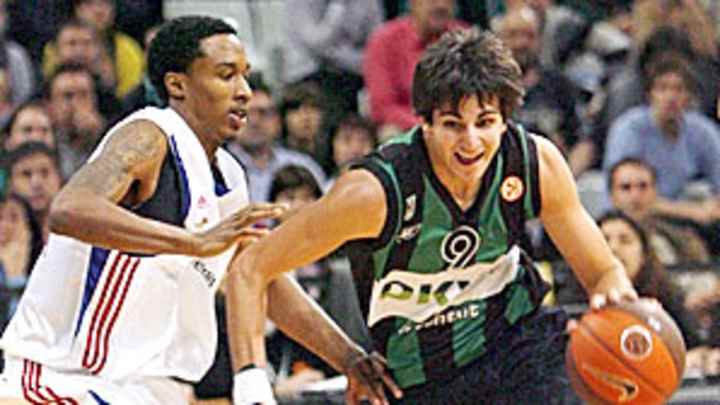European basketball faces issues


One year ago the Internet was popping with speculation of $30 million to $50 million salaries in Europe for LeBron James and Kobe Bryant. One year later and the reality is sobering: European basketball is suffering in ways that appear foreign to the NBA.
Players at a number of European teams are receiving their paychecks behind schedule, and some clubs are in danger of not meeting payroll. But that's not the real story.
"The biggest problem is that the agents aren't collecting their fees," said one of the many NBA executives who study European basketball. "Think about it: If a team is struggling to make ends meet, the team is going to pay the players first and worry about paying the agents later."
In the NBA, the agents are paid by players. In Europe, however, agents receive their commissions directly from the clubs.
Sponsors are disappearing in Europe much as in the United States, where NBA franchises are not receiving the anticipated income from auto manufacturers, banks and other sponsors that are suddenly unable to pay. The difference is that the NBA was able to secure a $200 loan to be distributed among 15 cash-poor teams.
The leagues in Europe can't dream of that kind of security because basketball isn't a profitable enterprise. Now there are rumors that 18-year-old Spanish point guard Ricky Rubio, the top European prospect should he choose to enter the NBA draft, could be moved for cash to a wealthier European club because current employer DKV Joventut of Spain is in trouble financially.
Two insiders have shot down the rumors, suggesting that Rubio will remain with Joventut for the rest of the year. For NBA fans, here is the real question: Does the recession in European basketball increase the chances that Rubio will enter the draft to cash in on a multiyear NBA rookie contract assuring him $3 million next season?
A similar question could be turned the other way for Josh Childress, who has been the subject of rumor since leaving the Atlanta Hawks last summer to join the Greek club Olympiakos. Having heard talk that Childress hasn't been paid on time and that his team was unhappy with his decision to undergo surgery in the United States for an abdominal tear, I reached out to his American agents, Lon Babby and Jim Tanner.
"This is completely not true," Tanner said. "He has been paid on time."
As for Childress' decision to undergo surgery in Philadelphia in January, Tanner said: "I was there for every step of the way. They sent their doctor over with him [to the United States] to get the second opinion without any reservation. Everyone was coordinated, he had the surgery done, they were perfectly fine with him rehabbing in Los Angeles. They couldn't have been better in terms of him dealing with the injury."
With the NBA market for free agents expected to shrink this summer, is Childress more likely to pick up his $6.5 million option and return to Olympiakos next summer? Not unlike the question of Rubio's future, it is too early to predict which side of the ocean Childress will choose.
The divide separating the richest clubs from the rest of Europe may widen over the year ahead. Based on its treatment of Childress, Olympiakos clearly is hoping to raise its profile by trying to deal with players to the NBA standard. While other clubs have trouble dealing with the financial crisis, Olympiakos may be able to seize an advantage because of its deep-pocketed owners.
This comes up because of an issue I raised last week when reporting that former NBA player Chris Morris and his American agent, Tom McLaughlin, are issuing subpoenas to the sponsors of Olympiakos in hopes of seizing close to $2 million in pay dating to the 2000-01 season. Both won civil judgments in U.S. District Court against Olympiakos, and now their international law firm, Yormick & Associates, is seeking to divert sponsorship payments from Coca-Cola, Nike and Citigroup.
Olympiakos basketball is run by the Aggelopoulos brothers, who inherited this lawsuit and are obviously trying to run their club to a higher standard. It will be interesting to see whether Olympiakos' past behavior damages the reputation of the club moving forward.
Clubs throughout Europe have grown more ethical in recent years in fulfilling the terms of contracts to players. While franchises in the NBA are held to a uniform code of rules and American law, the clubs in Europe operate to varying legal standards depending on the laws of their own country, be it Spain, Greece or Russia, where salaries are expected to be scaled back next season -- even at CSKA Moscow, which is under new ownership this season after behaving as the richest club in Europe over the previous five years.
A relatively new safeguard has been created. Players who believe they have been cheated of money may make an appeal before the FIBA Arbitral Tribunal in Switzerland, home to the international basketball federation. It can be an expensive process, however.
"I have spent 13,000 euros [more than $16,000] plus the costs for the lawyer," said agent Vadim Mikhalevskiy, who accuses the Russian Superleague club Spartak Primorie Vladivostok of refusing to pay former NBA center Zendon Hamilton since October. "They didn't like the way he played. They refused to fulfill the obligation, they just kick him out, they say to him 'bye bye' and that was the end.
"They've been acting like this for three or four years with the players and the agents," Mikhalevskiy added of Vladivostok. "It is very unfair and unprofessional. This team, you have to be aware of them. It is bulls---."
Mikhalevskiy expects to receive the arbitrator's decision in seven to 10 days.
